In a speech at the GOP Congressional Retreat, British Prime Minister Theresa May congratulated the party on its massive victory in the 2016 elections and said it “signaled a new era of American renewal.”
She characterized the victory as rooted in “the hopes and aspirations of working men and women”:
Though it’s sure to upset some, May spent quite a bit of time praising American, um, exceptionalism.
For more than two centuries, the very idea of America – drawn from history and given written form in a small hall not far from here – has lit up the world.
Her message centered on the “special relationship” between our countries, saying it’s “one of the greatest forces for progress this world has ever known.” After listing the victories in World War I and World War II, the creation of NATO, the United Nations, the IMF, and the World Bank as examples of progress pioneered by the United States and Britain, May said:
“We must never cease,” Churchill said, “to proclaim in fearless tones the great principles of freedom and the rights of man which are the joint inheritance of the English-speaking world and which through Magna Carta, the Bill of Rights, the Habeas Corpus, trial by jury, and the English common law, find their most famous expression in the American Declaration of Independence.”
So it is my honour and my privilege to stand before you today in this great city of Philadelphia to proclaim them again, to join hands as we pick up that mantle of leadership once more, to renew our Special Relationship and to recommit ourselves to the responsibility of leadership in the modern world.
Knowing that the United Nations is a tough subject to broach at a GOP Congressional retreat, May admitted that both the U.N. and NATO were in need of “reform and renewal” and that:
Sovereign countries cannot outsource their security and prosperity to America. And they should not undermine the alliances that keep us strong by failing to step up and play their part.
She didn’t hesitate to use the words “Islamic extremism” or “terrorist,” but used “Daesh” to refer to ISIS.
It is why I join you in your determination to take on and defeat Daesh and the ideology of Islamic extremism that inspires them and many others terrorist groups in the world today. It is in both of our national interests to do so. This will require us to use the intelligence provided by the finest security agencies in the world. And it will require the use of military might.
May defended the Iran deal, saying it neutralized the nuclear threat for a more than a decade, but only if rigorous inspections can be held and “any breaches be dealt with firmly and immediately.” She must have a higher degree of confidence that actual rigorous inspections can take place than most American conservatives do.
In closing, the Prime Minister advocated for a new trade agreement between the US and UK, reiterating the Cold War alliance of our countries and invoking memories of Ronald Reagan and Margaret Thatcher’s partnership.
Such an agreement would see us taking that next step in the special relationship that exists between us.
Seventy years ago in 1946, Churchill proposed a new phase in this relationship – to win a Cold War that many had not even realised had started. He described how an iron curtain had fallen from the Baltic to the Adriatic, covering all the capitals of the ancient states of Central and Eastern Europe….
Today those great cities – homes of great culture and heritage – live in freedom and peace. And they do so because of the leadership of Britain and America, and of Mrs Thatcher and President Reagan.
The Prime Minister was greeted with a standing ovation and had to stop for applause on multiple occasions. It is refreshing to hear foreign leaders unabashedly praise America’s leadership without resorting to shaming or bashing. It must be difficult for progressives to watch without feeling like they need to then apologize for our country.
Tomorrow, Prime Minister May will meet with President Trump.















Join the conversation as a VIP Member